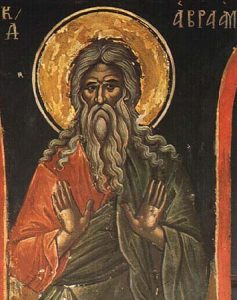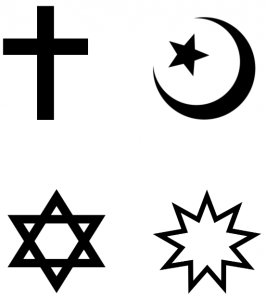Middle Eastern Origins
When we talk about the Abrahamic faith traditions, we often just think of Judaism, Christianity and Islam. But we should really include a fourth tradition–the Baha’i Faith, which comes out of Islam in the 19th century CE. These 4 faiths have a great deal in common, have common history and prophets, use overlapping scriptures, and come from the general area of the Middle East. All of them venerate Jerusalem as a holy city, and point back to Abraham and Sarah as original leaders who accepted and promoted monotheism.
And yet they differ in ways that do matter. There are varying ways of describing and relating to the divine. They each have prophets and leaders that the other traditions do not accept. The primary languages differ for the scriptures in each faith. Festivals, holy days, rituals–all have developed other ways of doing things, expressing their faith, living their beliefs, even as they continue to look back at the same roots.
We have some materials from the British Library written by Anna Sapir Abulafia [1] If you would like to read the entire article, it is at Abrahamic Religions

The term ‘Abrahamic’ highlights the hugely important role which the figure of Abraham plays in each of these traditions. Jews, Christians and Muslims look to their sacred texts to find the history of Abraham and how it has been interpreted through the ages. For Jews, the central text is the Hebrew Bible consisting of the Torah (the first five books or Pentateuch), the Prophets (Nevi’im) and the Writings (Ketuvim). Abraham’s story unfolds in Genesis, the first book of the Torah. Abraham is referred to over and over again throughout the Hebrew Bible as well as in post-biblical rabbinical materials interpreting the biblical narrative (Midrash). For Christians, the Hebrew Bible is the Old Testament, the precursor of the New Testament that narrates the birth, ministry, death and Resurrection of Jesus Christ as well as the life and preaching of the earliest followers of Jesus. For Christian understandings of Abraham the Letters of St Paul are of particular importance. Muslims engage with the figure of Abraham/Ibrāhīm in their holy book, the Qur’an, as well as in the Hadith, the body of writings which transmit the sayings and actions of the Prophet Muhammad.
The shared origins of the Abrahamic faiths
There are many different Jewish, Christian and Muslim traditions concerning Abraham. Interpretations of Abraham reflect the wide variety of beliefs and customs among Jews, Christians and Muslims at different times and in different places. Varieties exist within each tradition as well as between them. Recognition of how different these interpretations are and how often these interpretations exclude the other is important if one is to understand the tumultuous history of relations between Jews, Christians and Muslims. Wishful thinking of a peacefully shared Abrahamic vision belies the realities of centuries of bitter conflict and persecution. Having said that, it is also important to acknowledge the fruitful work that has been done in the field of interfaith dialogue over many years. A good example is the approach taken by the Oxford Abrahamic Group, which outlines Jewish, Christian and Muslim perspectives on Abraham, Moses, Jesus and Muhammad in order to find commonalities that can lead to fruitful discussions. Just as Abraham is seen by all three traditions to have been a man who put his trust in God, so too must the adherents of the three main Abrahamic religions trust each other enough to be able to engage in respectful dialogue.
Abulafia, Anna Sapir. “The Abrahamic Religions.” The British Library, The British Library, 7 Dec. 2018, www.bl.uk/sacred-texts/articles/the-abrahamic-religions.
- Anna Sapir Abulafia is Professor of the Study of the Abrahamic Religions at the Faculty of Theology and Religion at the University of Oxford and a Fellow of Lady Margaret Hall. She has published widely on medieval Christian-Jewish relations. At present she is engaged in a project examining the place of Jews and Muslims in Gratian’s Decretum. ↵



